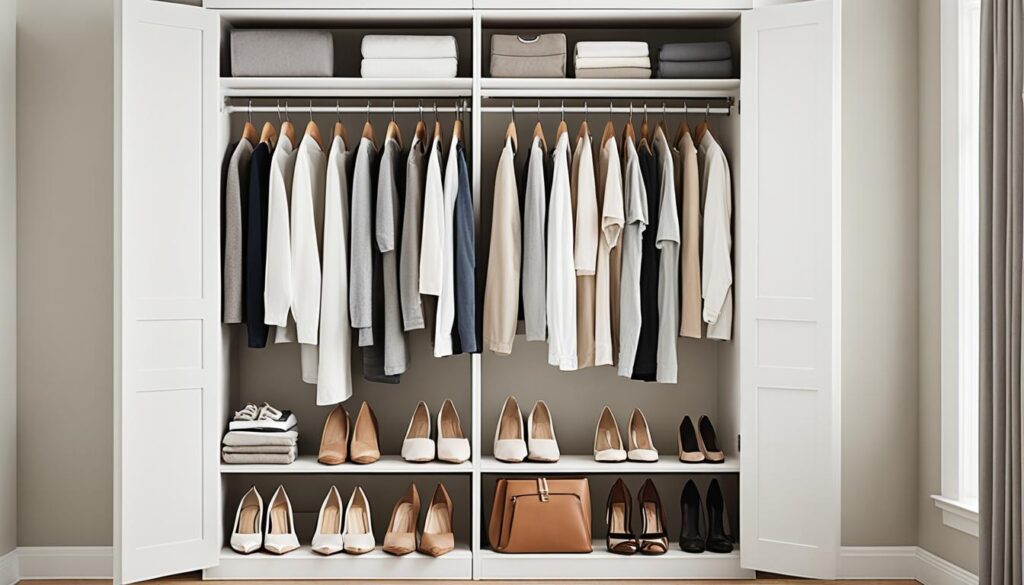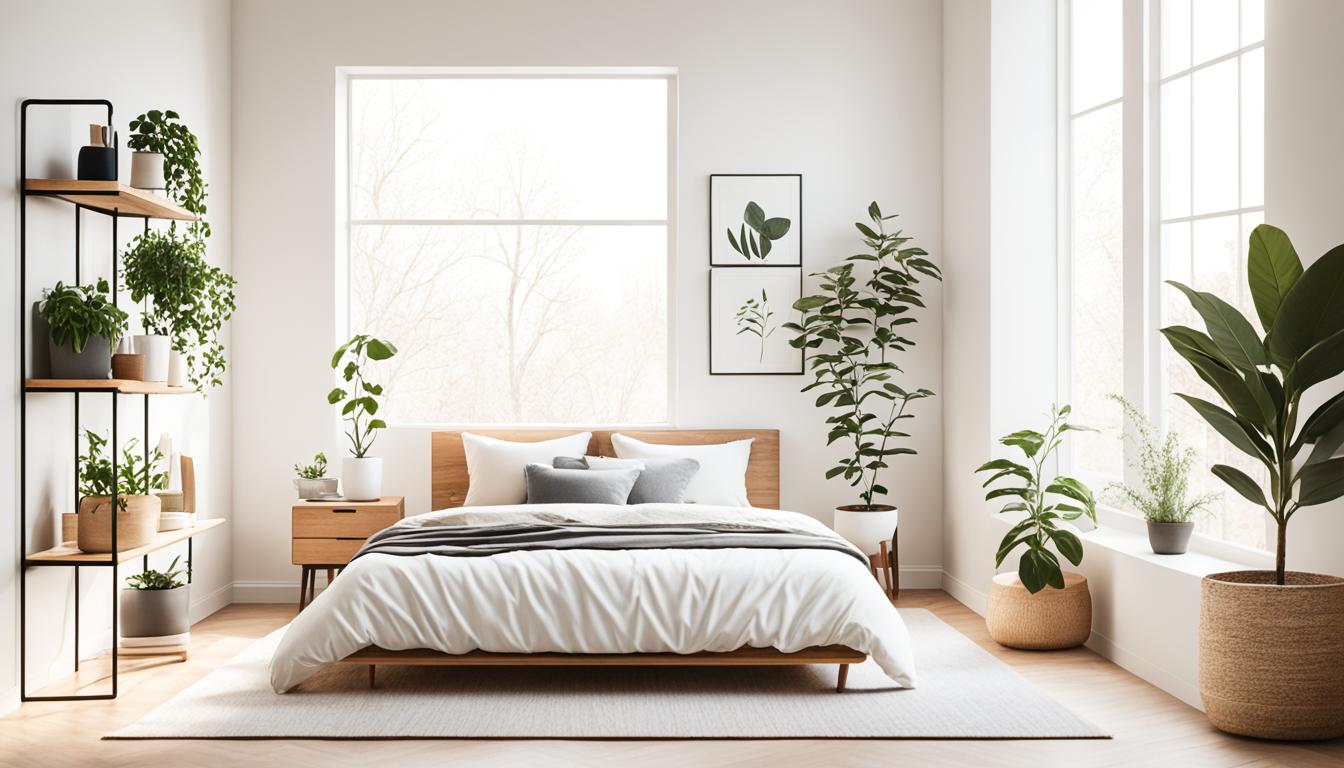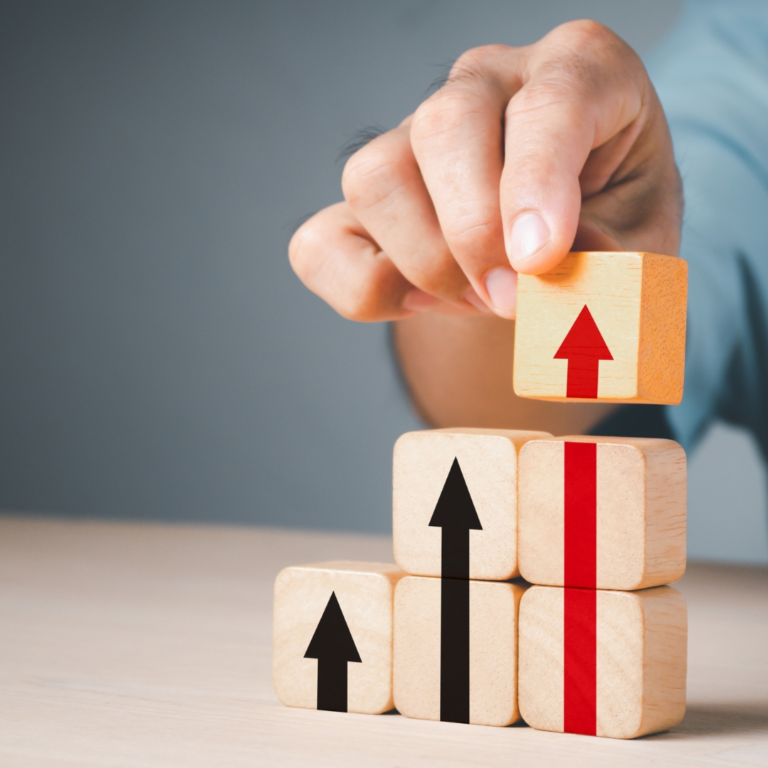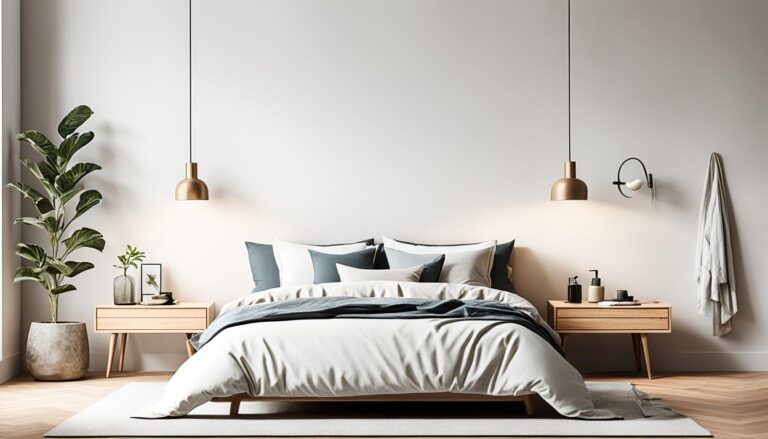Minimalism is becoming popular as people seek a simpler life. It’s about living with less stuff and focusing on what’s important. This way of life can make you feel less stressed and more in control.
Even if you’re not a true minimalist, these 7 habits can still make a big difference. They include starting your day simply, wearing fewer clothes, and keeping your home tidy. It also means being mindful of what you buy, being thankful for what you have, and using your time and technology wisely.
Key Takeaways
- Adopting a minimalist lifestyle can help simplify daily routines and reduce stress
- Decluttering and organizing your home can create a more peaceful environment
- Practicing mindful consumption and gratitude can lead to a more intentional and fulfilling life
- Prioritizing tasks and commitments can increase productivity and reduce overwhelm
- Using technology intentionally can improve focus and reduce digital clutter
Embrace a Simple Morning Routine
Starting your day with a mindful routine can change everything. If you wake up feeling stressed, that feeling can follow you all day. But, if you start calm and focus on a few important tasks, you’ll do better at reaching your goals.
The Importance of a Mindful Start to the Day
Simple morning habits are great for everyone. Studies show they can reduce stress, improve focus, boost creativity, and even make relationships better. By not using tech for at least 30 minutes after waking, you can calm down and start the day right.
Simple Morning Activities to Try
- Practice a quick meditation or gentle stretch session
- Take a leisurely walk around your block with a cup of coffee
- Read a chapter of a book you’re currently enjoying
- Put on your favorite playlist as you go through your skincare routine
Your morning routine should fit what you like and your life. The main thing is to pick activities that make you feel good and ready for the day.
“Starting the day with intention and mindfulness enhances focus throughout the day.”
By choosing a simple, mindful morning routine, you set yourself up for a better day. Try different activities to see what works best for you.
Simplify Your Wardrobe
Your closet might be too full, causing stress. A minimalist wardrobe can help. It makes getting ready faster and reduces outfit choices. By decluttering your closet, you focus on what you love and need. This makes dressing easier and boosts your confidence.
With a minimalist wardrobe, you have fewer, better items to mix and match. This simplifies your daily routine and encourages thoughtful fashion choices. Choose versatile, comfy, and well-fitting clothes to show off your style and lifestyle.
The Benefits of a Minimalist Wardrobe
- Reduced decision fatigue: Regularly reviewing your wardrobe can help you declutter and optimize your clothing selection, saving time and mental effort in the morning.
- Streamlined maintenance: Opting for easy-care clothes that are simple to wash and require minimal maintenance can save you time and energy.
- Enhanced personal style: Developing a personal daily uniform or signature style can simplify your wardrobe and help you feel more confident in your daily outfits.
- Improved organization: Organizing your wardrobe by category or color can make it easier to access and coordinate your clothes.
- Mindful shopping: Following trends cautiously and choosing a cohesive color palette can simplify your shopping process and enhance your outfit coordination.
Embracing a minimalist wardrobe brings many benefits. It leads to a more organized and thoughtful closet. This lets you focus on what’s important.

Declutter Your Home Regularly
Living in a space filled with too much stuff can hurt your well-being. It makes cleaning hard and lets dust and dander build up. Clutter also causes stress and anxiety, making it tough to be creative and make decisions.
By decluttering regularly, you can keep your home tidy and organized. This makes it easier to find what you need by getting rid of items that don’t matter or make you happy. Good decluttering tips include focusing on one room at a time, setting aside time for it, and being strict about what to keep or discard.
The Impact of Clutter on Well-being
Studies show that clutter can really affect your well-being. In fact, 89% of people felt less stressed after decluttering. Also, 73% said decluttering made their workspaces more efficient. Clutter can make you feel overwhelmed and unfocused, making it hard to relax and be productive.
Strategies for Effective Decluttering
Creating a decluttering routine is crucial for a clutter-free home. Here are some strategies to try:
- Start small: Begin with one room or area at a time, not your whole home at once.
- Set aside dedicated time: Make decluttering sessions a priority by scheduling them in your calendar.
- Be ruthless: Ask yourself if an item serves a purpose or makes you happy. If not, it’s time to go.
- Implement a system: Create a way to organize and store your kept items to keep your home clutter-free.
By following these decluttering habits, you can make your living space peaceful, functional, and pleasing to the eye. This supports your well-being and helps you live a minimalist lifestyle.
“Clutter is a physical manifestation of unmade decisions and the inability to make decisions. It has nothing to do with the value of the objects themselves.” – Peter Walsh, decluttering expert
Practice Mindful Consumption
In today’s fast world, it’s easy to shop without thinking and buy more stuff. But, mindful shopping and intentional spending are becoming popular. They help us live simpler and make choices that match our values. By choosing quality over quantity, we can live better and be happier.
Being mindful means thinking about how our buying affects the planet, our health, and our wallets. It’s about doing our homework on products, looking at their ethics and sustainability. And making choices that show what we believe in.
When we shop mindfully, we start by asking if we really need something. Then, we look for products that meet our standards, like being good for the planet or kind to animals. We learn about the people behind the products too. This way, we avoid buying things we don’t really need and make sure what we have is useful and meaningful.
“Mindful consumption is about aligning your spending with your values and priorities, rather than getting caught up in the constant cycle of acquiring more.”
By choosing mindful shopping and intentional spending, we can live in a minimalist and decluttered way. Our homes will be filled with things we love and use. This is good for the planet and makes us feel better, reducing stress and making decisions easier.

More people are now making mindful choices when they shop. They support local makers and buy products that last and are made ethically. This move towards mindful consumption is changing lives and making a difference in the world.
Cultivate an Attitude of Gratitude
In today’s fast-paced world, it’s easy to overlook the simple joys around us. A key part of living simply is to be thankful for what we have. By focusing on what we already have, we can find deep joy and contentment. Gratitude changes our view and makes us happier.
The Power of Gratitude
Studies show that writing about what we’re thankful for each week makes us more optimistic and cuts down on doctor visits. Writing gratitude letters makes us happier and keeps us feeling good for a month. 76% of people who practice gratitude see better mental health.
Simple Gratitude Practices
Adding gratitude to our daily life is easy. Keeping a gratitude journal with three to five things you’re thankful for each day can change a lot. Just taking a moment each morning to think about what you’re grateful for helps too.
Doing a gratitude challenge with someone can be really rewarding. It helps us connect with others and enjoy nature more. Appreciating what you have brings joy and contentment right now.
“Gratitude unlocks the fullness of life. It turns what we have into enough, and more. It turns denial into acceptance, chaos to order, confusion to clarity.” – Melody Beattie
Use Your Yeses Wisely: minimalist habits
Living a minimalist lifestyle means more than just having fewer things. It’s about being careful with your time too. Minimalists try to keep their calendars clear and tidy. They say “yes” only when it’s really important, avoiding too much work or too many plans.
This careful way of managing time lets minimalists enjoy more rest, time with loved ones, and surprise moments. Saying “yes” thoughtfully gives them freedom and flexibility. This way, they can live a simpler, more meaningful life.
Prioritize Your Time
Minimalists know how crucial intentional time management is. They think hard before saying yes or no to anything. This helps them minimize commitments and stay away from too much work. It leads to a calmer, less busy life.
- Look at your schedule and what you’re doing now.
- Find activities that don’t add much value or match your goals.
- Say no to things that don’t fit your life goals.
- Make time for rest, taking care of yourself, and being with people you care about.
Embrace a Flexible Mindset
Minimalists know life is full of surprises. They’re ready to change their plans when needed. This flexibility helps them keep a balance in their lives.
| Benefits of Minimalist Time Management | Potential Challenges |
|---|---|
|
|
By intentionally managing your time, minimizing commitments, and living an unbusy lifestyle, you can focus on what’s important. This leads to a more fulfilling and balanced life.
Conclusion
Adopting these 7 minimalist habits can change your daily life deeply. Start with a simple morning routine, reduce your clothes, and declutter your home often. Practice mindful buying, be thankful, use your time well, and be careful with technology. This way, you’ll have more space, clarity, and joy.
Many people find that living minimally helps them feel less stressed and happier. Studies show that 65% of those who go minimal feel better. Also, 72% get more done because they decluttered their spaces. Plus, 50% spend more time on self-care, and 85% feel more confident in their looks.
Living minimally means you focus on what’s important to you. It leads to a life that’s more meaningful and fulfilling. By choosing a simpler life, you can enjoy a lifestyle that lets you focus on what really counts.



